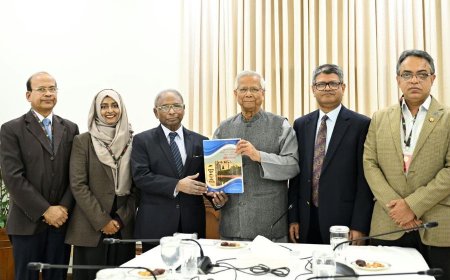The Way Ahead: Understanding the What, Why, and How of Reforming Bangladesh
The Way Ahead: Understanding the What, Why, and How of Reforming Bangladesh

The Path Forward: Rethinking Bangladesh’s Future
The Bangladesh 2.0 reset has commenced, but the nation finds itself at a critical juncture. This moment presents a unique chance to break away from the cycle of authoritarianism and foster a genuinely democratic future. However, this opportunity for change may be fleeting, making bold action essential now.
In a previous op-ed for the titled “A Second Chance,” I emphasized that Bangladesh is at a pivotal crossroad, with the potential to reshape its future. I stated, "Bangladesh has been granted a second chance, and ensuring success without reverting to past mistakes requires fundamental changes. This will not be easy. Although the path ahead is challenging, the 'whats' are clear, and the 'hows' will demand patience, determination, and foresight."
In this follow-up piece, I will focus on the path forward, specifically addressing the “hows” — the concrete steps we need to take to protect our democracy from slipping back into autocratic rule. Given the increasing political pressure, the urgency for decisive action has never been clearer.
Our governance structures, starting with the Constitution, are not immutable. Now is the time to rethink and reform them to ensure true representation and accountability.
Below, I outline concrete solutions (the "hows") to four critical issues (the "whats") and the reasoning (the "whys") behind each.
What: Rethinking Representation
Bangladesh’s first-past-the-post (FPTP) parliamentary voting system has concentrated power among those who win, even by narrow margins, effectively sidelining much of the electorate.
Why: This system often transforms slim majorities into supermajorities, granting winning parties disproportionate power, including the ability to amend the Constitution. Such concentration distorts governance, enabling the majority party to implement policies that marginalize minority voices.
The negative consequences of this imbalance are evident in our history. For instance, the creation of the Bangladesh Krishak Sramik Awami League (BAKSAL) in 1975 turned the country into a one-party state. Similarly, the BNP’s supermajority in 2001 and the Awami League’s in 2008 politicized the judiciary, curtailed democratic space, and led to the harsh suppression of dissent.
We have also previously experimented with a presidential system, which succumbed to autocratic tendencies, reducing parliament to a mere rubber stamp for the ruling party's president.
A side note: Article 70 of the Constitution must be abolished, as it restricts MPs from crossing party lines or voting according to their conscience, stifling dissent and limiting voter choice.
We need a fairer, balanced model that rectifies these historical flaws and accurately reflects the electorate's diversity and will.
How: To create more equitable governance, we should implement a hybrid electoral system that combines the strengths of proportional representation (PR) and FPTP voting. This system would address the shortcomings of both approaches, ensuring smaller parties are not excluded, as they are in FPTP, while avoiding the instability and fragmentation associated with pure PR models. While PR promotes fairer representation, it can lead to fragmented parliaments, making stable government formation difficult and resulting in policy paralysis.
Under this model, some seats would be filled through FPTP, where the candidate with the most votes in a constituency wins, preserving the direct connection between voters and representatives. The remaining seats would be allocated through PR, allowing parties to gain representation based on their share of the national vote, thus giving smaller parties a voice. By maintaining a majority of seats under FPTP, we ensure stability, while the PR component encourages political diversity. A minimum vote threshold for PR seats would help mitigate excessive fragmentation.
This balanced model would more accurately reflect the electorate's preferences, reducing the “tyranny of the majority” and ensuring that minority voices are heard.
What: Reforming the Judiciary
In addition to electoral reform, ensuring an independent judiciary is essential for preventing the abuse of state power and safeguarding individual rights.
Why: Political interference has repeatedly undermined the judiciary's independence, eroding public trust in the rule of law.
The controversial removal of the Chief Justice in 2017 severely compromised the court's integrity. In 2011, under pressure from the ruling party, the Supreme Court deemed the caretaker government system unconstitutional, facilitating amendments that enabled subsequent electoral manipulations.
Judicial independence is crucial for protecting citizens' rights and restoring public confidence in our legal system, which has been damaged by political meddling.
How: While some frameworks for judicial appointments and accountability exist, they are underdeveloped and lack independence and transparency. We must establish a Judicial Appointments Commission to select judges based on merit, legal expertise, and ethical conduct, ensuring political autonomy. Key appointments, especially to the Supreme Court, should undergo a transparent public vetting process to enhance public confidence.
We should also create an Independent Judicial Oversight Council to monitor appointments and secure judges’ tenure from political pressure. This council, comprised of impartial legal experts, would oversee disciplinary actions through transparent investigations. Regular performance reviews and a robust Code of Judicial Conduct would promote transparency and accountability.
What: Ensuring Fair Elections
While a strong judiciary serves as a vital check on power, free and fair elections are the cornerstone of any democracy. To genuinely reflect the people's will, Bangladesh must address the flaws in its electoral processes.
Why: Bangladesh has a long history of elections marred by allegations of irregularities and voter intimidation. The 2014 general election, which was boycotted by major opposition parties, was rife with accusations of voter suppression, ballot stuffing, and compromised oversight. Similarly, the 2018 election was plagued by reports of voter intimidation and restricted access for opposition candidates. The 2023 election continued this disturbing trend, marked by major opposition boycotts and widespread allegations of voter manipulation and intimidation, further eroding public trust in the electoral process.
How: We must reinstate a reformed Caretaker Government System to oversee elections and ensure neutrality. This new iteration must have clearly defined terms and limited powers focused solely on electoral oversight. The caretaker government should consist of non-partisan individuals such as retired judges, respected civil society members, and other neutral figures. We should also implement mechanisms for judicial review to ensure accountability throughout their limited tenure.
Moreover, we need to reform the Election Commission (EC) to guarantee its independence, including a transparent selection process for commissioners akin to those proposed for judicial reforms. The EC must have financial autonomy and be granted judicial and police powers to command security forces, thereby preventing voter intimidation and ballot-stuffing. It must oversee transparent ballot counting free from interference and ensure unbiased media coverage throughout the electoral process.
These changes will help restore the integrity of elections and rebuild public trust in the democratic process.
What: Introducing a Second Chamber
In addition to electoral and judicial reforms, enhancing parliamentary oversight is essential to prevent the concentration of power. Establishing a second chamber can provide crucial checks on legislative processes.
Why: Most stable democracies, including countries like the United Kingdom with its House of Lords and India with its Rajya Sabha, have successfully implemented bicameral systems that improve governance by providing oversight and enhancing the legislative process. These examples demonstrate how a bicameral legislative system can prevent hasty decision-making, promote careful review of laws, and foster diverse representation. In Bangladesh, where concentrated power has occasionally led to rushed or controversial legislative changes, this would be especially beneficial.
How: We should establish a second chamber, or an Upper House, in Bangladesh's parliament to enhance governance by incorporating expertise and diverse perspectives. The second chamber would serve as a revising body, capable of suggesting amendments or delaying legislation passed by the directly elected lower house, ensuring that laws receive thorough scrutiny.
The composition of this Upper House could follow a mixed model to balance expertise with democratic representation. Members could be selected through appointments from regional councils, professional bodies, community organizations, and elected representatives from specific groups, such as minority communities or underrepresented regions. This would ensure that various interests and voices are represented in national decision-making.
Joint sessions or mediation committees could be established to resolve conflicts and facilitate smooth decision-making between the two chambers. While the lower house, as the directly elected body, would retain the ability to veto decisions, the second chamber would add valuable oversight and a wider array of perspectives to the legislative process. This structure would create a more robust and inclusive governance system that prevents the concentration of power and promotes better laws through deeper scrutiny.
As history has taught us repeatedly, “Those who cannot remember the past are condemned to repeat it” (George Santayana). The lessons of our past are unmistakable: without a constitution that prevents the abuse of power, we risk reliving history.
The current administration, under Mohammad Yunus, has a time-limited mandate and needs sufficient time to address the fundamental flaws in our governance. We must support and allow them the time necessary to enact these vital changes. Real transformation demands shared commitment, patience, and foresight. Now is the time to act—to build a future where no one can monopolize power, all voices contribute to decision-making, and democracy flourishes with integrity.
What's Your Reaction?





















































































